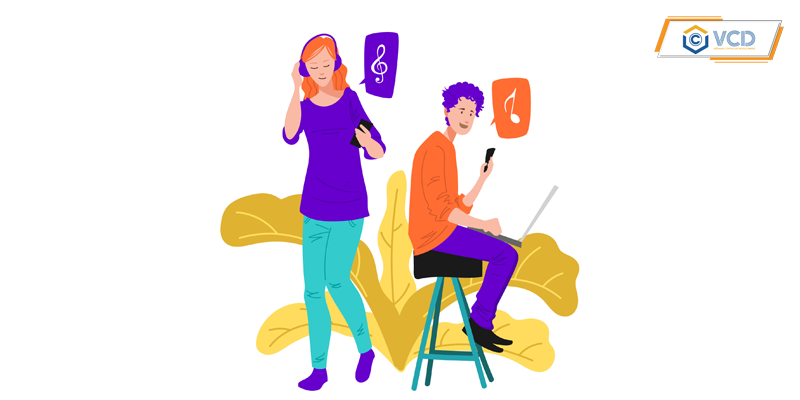How to resolve music copyright disputes
Currently, the problem of music copyright infringement in Vietnam is quite common and complicated. This situation includes many different forms of infringement, from singing without permission, and quoting music widely to organizing music programs without paying copyright fees. Even more special, copyright disputes are also quite complicated when the disputing parties cannot find a common voice in the resolution mechanism. So how to resolve music copyright disputes?. Please follow the article of VCD below.
1. Why do music copyright disputes happen?
According to the provisions of Article 10 of Decree No. 22/2018/ND-CP, a musical work is understood as a work expressed in the form of musical notes in a musical score or other musical symbols or shaped on a recording, video recording with or without lyrics, regardless of whether it is performed or not.
Therefore, music copyright is understood as the author’s right to his work expressed in the form of musical notes in a musical score or other musical symbols or shaped on a recording, video recording with or without lyrics, regardless of whether it is performed or not performed from the time the author creates the work.
Music copyright disputes are disputes, conflicts or contradictions between parties related to ownership, rights of use, rights of distribution or other interests related to musical works.
Music copyright disputes often arise from many different causes. Here are some common causes:
- Awareness of compliance with Music Copyright of program organizers is not really high:
- Lack of awareness: Many program organizers are not fully aware of the importance of compliance with music copyright. Copyright fees should be considered an essential part of the program, similar to fees paid to singers or venue rental units.
- Delayed copyright negotiations: Many programs have taken place or are close to the performance date but have not yet purchased copyright or have not completed copyright negotiations.
- The lack of determination of authors and management agencies in protecting copyright:
- Lack of lawsuits: Although the law allows authors, owners of works and representative units to file lawsuits to request the termination of infringement or to request compensation for damages, in reality very few or no disputes are brought to court.
- Difficulty in proving damages: According to the law, proving damages is a difficult thing, which reduces the ability of the infringed parties to sue.
- The effectiveness of administrative sanctions is not high:
- The fine level is not enough to deter: The maximum fine for organizations violating copyright is 500 million VND and for individuals is 250 million VND. However, the administrative sanctions decisions have not been widely announced, so the deterrent effect of this measure is not high.

2. Resolving music copyright disputes
The law on intellectual property protection has given authors and/or copyright and related rights owners the right to protect themselves against infringements of their music copyright by choosing various measures such as: applying technology to prevent infringements, registering copyrights with competent state agencies for legal protection and legal evidence…
When a music copyright dispute occurs, the author or copyright and related rights owner should directly contact a law practice organization, a copyright and related rights representative organization to receive prompt legal advice. With many years of experience in the field of legal advice on copyright and related rights, VCD is a collective organization representing clients to resolve disputes related to copyright, especially music copyright, both domestically and internationally. VCD will follow the following process:
Step 1: Identify copyright infringement
- VCD will represent the client to review and evaluate copyright infringement, thereby providing initial solutions for the client. Specifically, the tasks include:
- Review and evaluate the copyright contract provided by the client: VCD will review the terms of the copyright contract to identify infringements.
- Establish evidence of infringement: Collect and establish evidence of copyright infringement.
- Send the infringing content to the Copyright and Related Rights Appraisal Center to the Copyright Office: request to conduct an appraisal to determine the infringement.
Step 2: Represent the settlement of copyright disputes based on a spirit of cooperation
- Send a warning letter: Send a warning letter to the party in dispute with the client, requesting to stop the infringement.
- Organize a face-to-face meeting: Arrange a face-to-face meeting to negotiate and reconcile with the disputing party, ensuring goodwill and cooperation.
Step 3: Request administrative sanctions for acts of infringement of copyright and related rights
- If negotiation and reconciliation are unsuccessful, VCD will perform the following steps:
- Submit a request for administrative sanctions: Submit a request to the competent state agency to impose administrative sanctions on the disputing party.
- Request to stop the infringement: Request the infringing party to stop the infringement, apologize, make public corrections and compensate for damages according to the provisions of law.
Step 4: File a lawsuit for the dispute according to procedural law
- If the customer requests, VCD will be the representative to file a lawsuit with a court or a competent commercial arbitration to protect the customer’s legitimate rights and interests.
- File a lawsuit in court or commercial arbitration: File a lawsuit and participate in court hearings to protect the rights of customers.
- Send the file to the police: If a criminal element is detected, send the file to the police to initiate a criminal case according to the provisions of the law.
VCD finds that the situation of music copyright infringement in Vietnam is quite common and complicated, causing many negative consequences for authors and the music industry. To overcome this situation, it is necessary to raise awareness of law compliance, strengthen inspection and punishment, as well as apply modern technologies to protect copyright.
